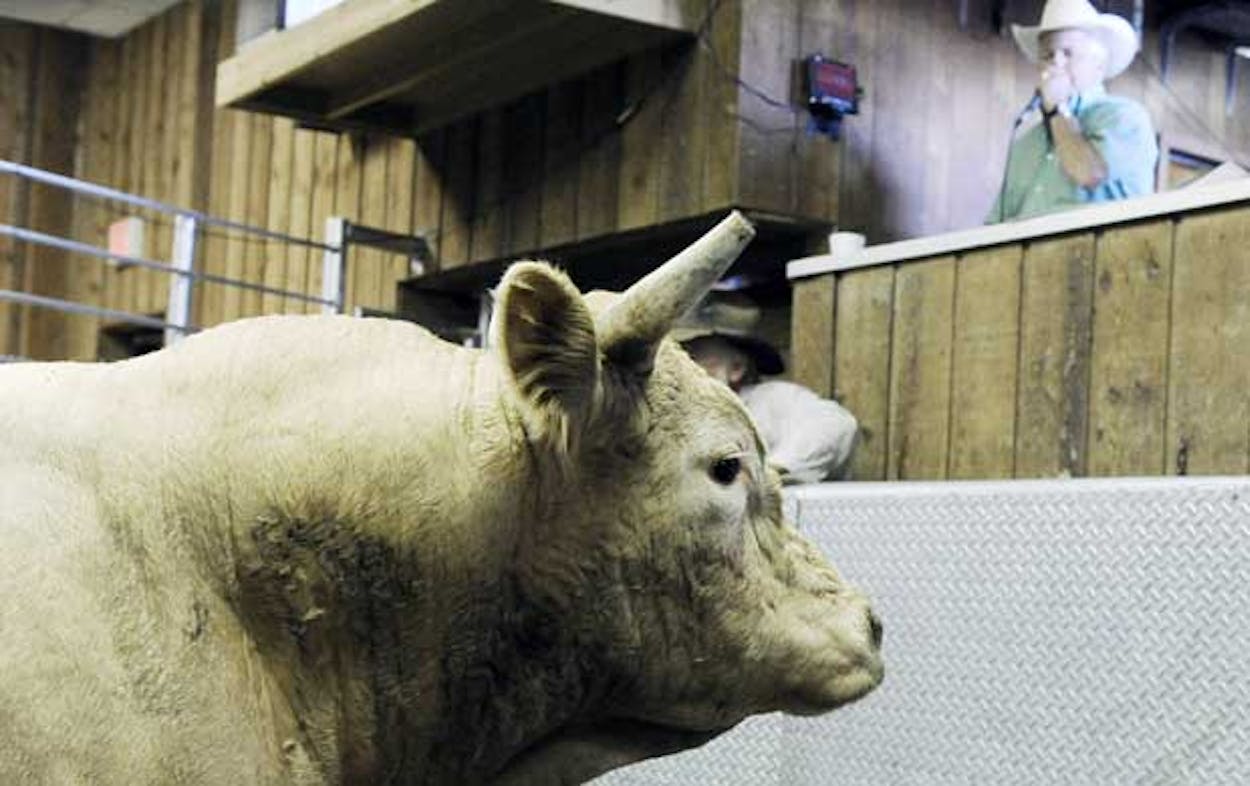The Texas economy is one of the most robust in the world. Wildly profitable companies and ingenious entrepreneurs call this state home, and what happens here influences businesses around the nation. Here’s a slice of the profits, losses, big deals, and backroom decisions happening across Texas this week.
Cold Herd Cash
This week’s rain bodes well for Texas cattle ranchers, many of whom are still reeling from losses associated with last year’s drought. Demand for beef is on the rise and herd sizes are low, and the wet weather is inspiring confidence that now is the time to rebuild. The industry is already beginning to see an uptick in cattle prices — quality cows are selling for about $1,200 more than they did a year ago, and bulls are worth about $500 more, the Associated Press reports.
Texas’ livestock herd last year dropped to its smallest size in more than 50 years, as the drought “forced ranchers to cut their herds because they had no grass and couldn’t afford high hay prices,” according to the AP. But thanks to record-breaking rainfall through the winter and early spring, the outlook is improving.
The Bottom Line: The rebound is good news, but many ranchers, feedlots and livestock dealers are hesitant to rush into ramping their operations back up to pre-drought levels. According to the AP, the industry may take another five years to recover, and climatologists are forecasting a full decade of low rainfall in Texas.
Wind in our Shales
The Eagle Ford shale region in South Texas has become one of the state’s most important economic drivers, according to a new report released this week by the University of Texas at San Antonio. The study finds that the oil and gas hub directly and indirectly supported more than 47,000 jobs, primarily in drilling, construction, and restaurants and bars that cater to employees and their families.
Eagle Ford had an economic impact of about $25 billion in 2011 alone, including $257 million in local government revenue and $358 million in state revenue. Reuters reports that oil production in the region has increased six-fold since 2010, and natural gas production has doubled. The shale formation stretches from Nuevo Laredo to north of Houston.
The Bottom Line: The rapid growth also comes with challenges. Constant heavy truck traffic has deteriorated local roads, and there are concerns about potential labor or housing shortages, according to the Associated Press.
Remotely Secure
AT&T announced this week that it is launching a new product that will allow users to monitor home security systems and control electronic devices from mobile devices and PCs. The system, called Digital Life, can connect to “cameras, window and door sensors, smoke and carbon monoxide detectors, automated door locks, thermostats” and any device that plugs into an electrical outlet, the Washington Post reports.
The Bottom Line: The Dallas-based communications titan is stepping up efforts to compete with products such as Verizon’s Home Monitoring and Control package, which launched last year. Trials for Digital Life are scheduled to begin in Dallas and Atlanta this summer, but there is no timeline for rolling it out nationwide.
Come and Ticket
Plano-based movie theater chain Cinemark reported this week that profits grew by nearly 70 percent in the first quarter of 2012 compared to the same period last year. According to the Dallas Business Journal, the company benefited from an industry-wide box office revenue boom at North American theaters, which collectively saw a 24-percent increase in ticket sales last quarter.
The Bottom Line: Theater attendance figures declined in 2011 but have rebounded significantly so far this year, according to the Los Angeles Times. Another factor driving the box office rebound is an increase in movie ticket prices, which rose to a record annual average of $7.93 last year.
Winners of the Week: Indie Video Game Studios
Austin video game companies are powering up with help from supporters on the online fundraising platform Kickstarter. The Austin American Statesman reported reported on the crowd-funding trend this week, highlighting local studios whose latest projects were made possible by Kickstarter backers.
Last week, Austin game publisher Replay Games passed its goal of raising $650,000 to remake the ’80s throwback “Leisure Suit Larry.” Local startup White Whale Games took in $5,000 to fund a new game called “God of Blades.” And another Austin studio, Stoic, raised $720,000 for its game, titled “The Banner Saga” — an impressive feat, especially considering the company had set an initial goal of $100,000.
Loser of the Week: GameStop
While independent video game makers are thriving, the same cannot be said for GameStop. The Grapevine-based game retailer is on a quest to stay afloat in a stagnant market. This week, GameStop reported a drop in earnings for the first quarter, as well as a 12.5-percent decrease in same-store sales. The company “blamed the quarterly sales slide to the lack of blockbuster game launches,” Reuters reports.
However, analysts say GameStop is actually doing better than many other game retail chains. The industry saw a 32-percent decline in video game hardware and software sales nationwide last month, due in large part to the rise of mobile gaming, according to Reuters.






